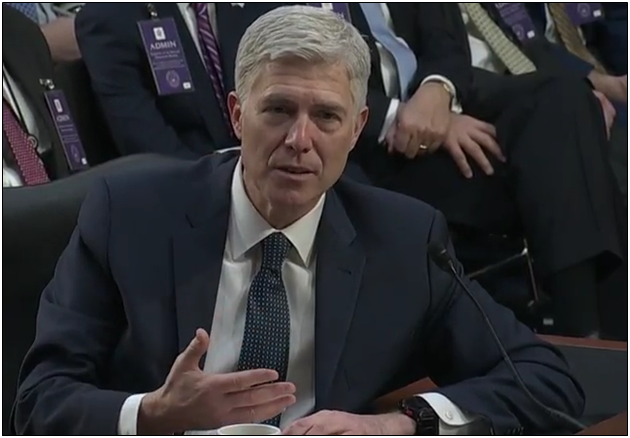By Peter Hong
I’m a constitutional conservative who passionately supports the speedy confirmation of Judge Neil Gorsuch for Associate Justice of the U.S. Supreme Court.
So, I won’t blame you if you expect this to be another plea for Democrats not to filibuster the Gorsuch nomination. But it’s not.
Here are just a few reasons why the Democrats have every reason to hold their ground and demand 60 votes to proceed to a final vote on confirming Neil Gorsuch.
It’s a matter of political survival.
There is one absolute maxim about politicians: they want to be elected (and reelected). For anyone wondering about the stakes for Senate Democrats of this confirmation fight, former Democratic National Committee Chairman Howard Dean made it very clear:
“I can tell you right now if Judge Gorsuch if he’s confirmed by Democrats — that is unless we force McConnell to exercise the nuclear option — if he’s confirmed straight up with 60 votes, 10 of which are Democratic, the Democratic Senatorial committee might as well hang it up ’cause they’ll never raise any money from our base.”
Dean’s statement is exactly right, with one caveat. Today, political candidates depend on their bases for more than just money. As the 2016 elections spelled out, we are now in the era of “base elections”: whoever does a better job energizing their base (or depressing the base of their opponent) wins.
While this maxim applied to the presidential race last year, it’s been a political truth for off-year elections, like 2018, since time in memoriam (think 1994, 2002, 2006, 2010, and 2014). With 25 Senate seats to defend this cycle, Democrats have to keep their base engaged and energized.
Political bases are a lot like hungry lions: if you don’t feed them, they’ll feed on you. After losing the election to Donald Trump, the Democratic base is starving and looking for red meat. Because of Republicans failing to coalesce around a legislative agenda, the only opportunities around which Democrats can rally are opposing Trump nominations. The harsh line of attacks against Cabinet nominees, like Sessions, DeVos, and Puzder, were only previews for the fight over the Court.
Gorsuch is the nightmare nominee (for them).
When President Trump announced the Gorsuch nomination, you could hear the meltdown among Senate Democrats — and with good reason. A judge’s judge and carrying the highest rating offered by the American Bar Association, Neil Gorsuch is a Supreme Court nominee straight out of Central Casting. In the mold of his predecessor, the late Justice Antonin Scalia, Gorsuch’s stellar judicial record reveals a jurist who interprets — rather than rewrites — the Constitution and follows the rule of law to reach his decisions, rather than the other way around.
He’s just the kind of judge Democrats hate — with the judicial qualifications they cannot impeach.
The confirmation of Judge Gorsuch will only restore the Supreme Court to its ideological balance prior to the death of Justice Scalia. But having failed to consolidate the Court’s liberal majority with the Merrick Garland nomination, Democrats cannot possibly be satisfied with maintaining the status quo.
What’s worse for fans of judicial activism is Judge Gorsuch’s intellect, judicial experience and compelling writing style. He won’t be just another vote, but will leave a powerful legacy on the Court, and at age 49, a lasting one. With litmus test issues — like abortion, Second Amendment, campaign finance, and the power of the administrative state — on the line, you can bet that this is five-bell alarm time for Democrats.
They need to avoid political irrelevance.
Having lost the White House and both houses of Congress (not to mention, multitudes of state and local offices), the Democrats are suffering from severe political irrelevance. Due only to Republican failures to get their legislative agenda on track have Democrats managed to avoid a path of complete isolation.
Even after a week of desperately haranguing Judge Gorsuch, Democrats have only been able to register a blip on the political radar screen. According to a CBS poll, 60 percent of Democrats cannot say whether or not Gorsuch should be confirmed (as opposed to only 34 percent of undecided Republicans). A highly publicized filibuster is the only way Democrats can hope to break through the media clutter of Trump, health care, and the Russians. Senate Judiciary Committee Chairman Chuck Grassley marveled at the Democrats seeking to filibuster a nominee as qualified as Gorsuch. He shouldn’t have. They’re desperate.
Given the Democrats’ need to filibuster the nomination, the Republican response seems pretty simple: confirm Gorsuch at all costs, even if that means putting an end to filibusters on all judicial nominees. Majority rules.
Even still, Democrats are trying to lure Republican senators into breaking ranks and cutting a deal to preserve the filibuster for future Supreme Court nominations. As the Wall Street Journal rightly stated in a March 31 editorial, any agreement to deal away political leverage to the minority for future Trump nominees would constitute an act of political suicide.
If the Republicans want to avoid snatching defeat out of the jaws of political victory, Senate Majority Leader Mitch McConnell must lay down the law next week: no deals, no compromises, no chance.
Democrats are doing what they need to do. Now, it’s the Republicans’ turn.
Peter Hong is a contributing reporter at Americans for Limited Government.







